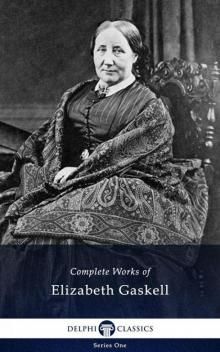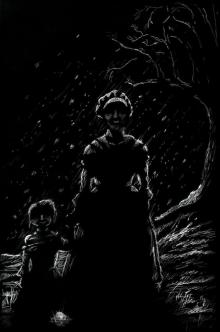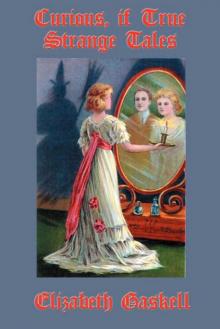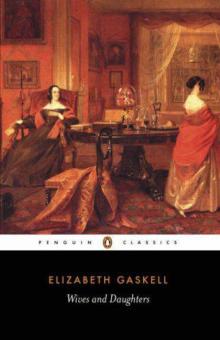- Home
- Elizabeth Gaskell
Cranford Page 2
Cranford Read online
Page 2
It was very good of Miss Jenkyns to do this; for I had seen that, a little before, she had been a good deal annoyed by Miss Jessie Brown’s unguarded admission (à propos of Shetland wool) that she had an uncle, her mother’s brother, who was a shopkeeper in Edinburgh. Miss Jenkyns tried to drown this confession by a terrible cough – for the Honourable Mrs Jamieson was sitting at the card-table nearest Miss Jessie, and what would she say or think, if she found out she was in the same room with a shopkeeper’s niece! But Miss Jessie Brown (who had no tact, as we all agreed, the next morning) would repeat the information, and assure Miss Pole she could easily get her the identical Shetland wool required, ‘through my uncle, who has the best assortment of Shetland goods of any one in Edinbro’.’ It was to take the taste of this out of our mouths, and the sound of this out of our ears, that Miss Jenkyns proposed music; so I say again, it was very good of her to beat time to the song.
When the trays reappeared with biscuits and wine, punctually at a quarter to nine, there was conversation; comparing of cards, and talking over tricks; but by-andby, Captain Brown sported a bit of literature.
‘Have you seen any numbers of “The Pickwick Papers?”’ said he. (They were then publishing in parts.) ‘Capital thing!’
Now, Miss Jenkyns was daughter of a deceased rector of Cranford; and, on the strength of a number of manuscript sermons, and a pretty good library of divinity, considered herself literary, and looked upon any conversation about books as a challenge to her. So she answered and said, ‘Yes, she had seen them; indeed, she might say she had read them.’
‘And what do you think of them?’ exclaimed Captain Brown. ‘Aren’t they famously good?’
So urged, Miss Jenkyns could not but speak.
‘I must say, I don’t think they are by any means equal to Dr Johnson. Still, perhaps, the author is young. Let him persevere, and who knows what he may become if he will take the great Doctor for his model.’ This was evidently too much for Captain Brown to take placidly; and I saw the words on the tip of his tongue before Miss Jenkyns had finished her sentence.
‘It is quite a different sort of thing, my dear madam,’ he began.
‘I am quite aware of that,’ returned she. ‘And I make allowances, Captain Brown.’
‘Just allow me to read you a scene out of this month’s number,’ pleaded he. ‘I had it only this morning, and I don’t think the company can have read it yet.’
‘As you please,’ said she, settling herself with an air of resignation. He read the account of the ‘swarry’ which Sam Weller gave at Bath. Some of us laughed heartily. I did not dare, because I was staying in the house. Miss Jenkyns sat in patient gravity. When it was ended, she turned to me, and said with mild dignity:
‘Fetch me Rasselas, my dear, out of the bookroom.’
When I brought it to her, she turned to Captain Brown:
‘Now allow me to read you a scene, and then the present company can judge between your favourite, Mr Boz, and Dr Johnson.’
She read one of the conversations between Rasselas and Imlac, in a high-pitched majestic voice; and when she had ended, she said, ‘I imagine I am now justified in my preference of Dr Johnson as a writer of fiction.’ The captain screwed his lips up, and drummed on the table, but he did not speak. She thought she would give a finishing blow or two.
‘I consider it vulgar, and below the dignity of literature, to publish in numbers.’
‘How was the Rambler published, ma’am?’ asked Captain Brown in a low voice; which I think Miss Jenkyns could not have heard.
‘Dr Johnson’s style is a model for young beginners. My father recommended it to me when I began to write letters, – I have formed my own style upon it; I recommend it to your favourite.’
‘I should be very sorry for him to exchange his style for any such pompous writing,’ said Captain Brown.
Miss Jenkyns felt this as a personal affront, in a way of which the captain had not dreamed. Epistolary writing, she and her friends considered as her forte. Many a copy of many a letter have I seen written and corrected on the slate, before she ‘seized the half-hour just previous to post-time to assure’ her friends of this or of that; and Dr Johnson was, as she said, her model in these compositions. She drew herself up with dignity and only replied to Captain Brown’s last remark by saying, with marked emphasis on every syllable, ‘I prefer Dr Johnson to Mr Boz.’
It is said – I won’t vouch for the fact – that Captain Brown was heard to say sotto voce, ’D—n Dr Johnson!’ If he did, he was penitent afterwards, as he showed by going to stand near Miss Jenkyns’s arm-chair, and endeavouring to beguile her into conversation on some more pleasing subject. But she was inexorable. The next day, she made the remark I have mentioned, about Miss Jessie’s dimples.
II
The Captain
It was impossible to live a month at Cranford, and not know the daily habits of each resident; and long before my visit was ended, I knew much concerning the whole Brown trio. There was nothing new to be discovered respecting their poverty; for they had spoken simply and openly about that from the very first. They made no mystery of the necessity for their being economical. All that remained to be discovered was the captain’s infinite kindness of heart, and the various modes in which, unconsciously to himself, he manifested it. Some little anecdotes were talked about for some time after they occurred. As we did not read much, and as all the ladies were pretty well suited with servants, there was a dearth of subjects for conversation. We therefore discussed the circumstance of the captain taking a poor old woman’s dinner out of her hands, one very slippery Sunday. He had met her returning from the bakehouse as he came from church, and noticed her precarious footing; and, with the grave dignity with which he did everything, he relieved her of her burden, and steered along the street by her side, carrying her baked mutton and potatoes safely home. This was thought very eccentric; and it was rather expected that he would pay a round of calls, on the Monday morning, to explain and apologize to the Cranford sense of propriety: but he did no such thing; and then it was decided that he was ashamed, and was keeping out of sight. In a kindly pity for him, we began to say – ‘After all, the Sunday morning’s occurrence showed great goodness of heart’; and it was resolved that he should be comforted on his next appearance amongst us; but, lo! he came down upon us, untouched by any sense of shame, speaking loud and bass as ever, his head thrown back, his wig as jaunty and well-curled as usual, and we were obliged to conclude he had forgotten all about Sunday.
Miss Pole and Miss Jessie Brown had set up a kind of intimacy, on the strength of the Shetland wool and the new knitting stitches; so it happened that when I went to visit Miss Pole, I saw more of the Browns than I had done while staying with Miss Jenkyns; who had never got over what she called Captain Brown’s disparaging remarks upon Dr Johnson, as a writer of light and agreeable fiction. I found that Miss Brown was seriously ill of some lingering, incurable complaint, the pain occasioned by which gave the uneasy expression to her face that I had taken for unmitigated crossness. Cross, too, she was at times, when the nervous irritability occasioned by her disease became past endurance. Miss Jessie bore with her at these times even more patiently than she did with the bitter self-upbraidings by which they were invariably succeeded. Miss Brown used to accuse herself, not merely of hasty and irritable temper; but also of being the cause why her father and sister were obliged to pinch, in order to allow her the small luxuries which were necessaries in her condition. She would so fain have made sacrifices for them and have lightened their cares, that the original generosity of her disposition added acerbity to her temper. All this was borne by Miss Jessie and her father with more than placidity – with absolute tenderness. I forgave Miss Jessie her singing out of tune, and her juvenility of dress, when I saw her at home. I came to perceive that Captain Brown’s dark Brutus wig and padded coat (alas! too often threadbare) were remnants of the military smartness of his youth, which he now wore unconsciously. He was a man of
infinite resources, gained in his barrack experience. As he confessed, no one could black his boots to please him, except himself: but, indeed, he was not above saving the little maid-servant’s labours in every way, – knowing, most likely, that his daughter’s illness made the place a hard one.
He endeavoured to make peace with Miss Jenkyns soon after the memorable dispute I have named, by a present of a wooden fire-shovel (his own making), having heard her say how much the grating of an iron one annoyed her. She received the present with cool gratitude, and thanked him formally. When he was gone, she bade me put it away in the lumber-room; feeling, probably, that no present from a man who preferred Mr Boz to Dr Johnson could be less jarring than an iron fire-shovel.
Such was the state of things when I left Cranford and went to Drumble. I had, however, several correspondents who kept me au fait as to the proceedings of the dear little town. There was Miss Pole, who was becoming as much absorbed in crochet as she had been once in knitting; and the burden of whose letter was something like, ‘But don’t you forget the white worsted at Flint’s,’ of the old song; for, at the end of every sentence of news, came a fresh direction as to some crochet commission which I was to execute for her. Miss Matilda Jenkyns (who did not mind being called Miss Matty, when Miss Jenkyns was not by) wrote nice, kind, rambling letters; now and then venturing into an opinion of her own; but suddenly pulling herself up, and either begging me not to name what she had said, as Deborah thought differently, and she knew; or else putting in a postscript to the effect that, since writing the above, she had been talking over the subject with Deborah, and was quite convinced that, &c. – (here, probably followed a recantation of every opinion she had given in the letter). Then came Miss Jenkyns – Deborah, as she liked Miss Matty to call her; her father having once said that the Hebrew name ought to be so pronounced. I secretly think she took the Hebrew prophetess for a model in character; and, indeed, she was not unlike the stern prophetess in some ways; making allowance, of course, for modern customs and difference in dress. Miss Jenkyns wore a cravat, and a little bonnet like a jockey-cap, and altogether had the appearance of a strong-minded woman; although she would have despised the modern idea of women being equal to men. Equal, indeed! she knew they were superior. – But to return to her letters. Everything in them was stately and grand, like herself. I have been looking them over (dear Miss Jenkyns, how I honoured her!), and I will give an extract, more especially because it relates to our friend Captain Brown:
‘The Honourable Mrs Jamieson has only just quitted me; and, in the course of conversation, she communicated to me the intelligence, that she had yesterday received a call from her revered husband’s quondam friend, Lord Mauleverer. You will not easily conjecture what brought his lordship within the precincts of our little town. It was to see Captain Brown, with whom, it appears, his lordship was acquainted in the “plumed wars,” and who had the privilege of averting destruction from his lordship’s head, when some great peril was impending over it, off the misnomered Cape of Good Hope. You know our friend the Honourable Mrs Jamieson’s deficiency in the spirit of innocent curiosity; and you will therefore not be so much surprised when I tell you she was quite unable to disclose to me the exact nature of the peril in question. I was anxious, I confess, to ascertain in what manner Captain Brown, with his limited establishment, could receive so distinguished a guest; and I discovered that his lordship retired to rest, and, let us hope to refreshing slumbers, at the Angel Hotel; but shared the Brunonian meals during the two days that he honoured Cranford with his august presence. Mrs Johnson, our civil butcher’s wife, informs me that Miss Jessie purchased a leg of lamb; but, besides this, I can hear of no preparation whatever to give a suitable reception to so distinguished a visitor. Perhaps they entertained him with “the feast of reason and the flow of soul”; and to us, who are acquainted with Captain Brown’s sad want of relish for “the pure wells of English undefiled,” it may be matter for congratulation, that he has had the opportunity of improving his taste by holding converse with an elegant and refined member of the British aristocracy. But from some mundane failings who is altogether free?’
Miss Pole and Miss Matty wrote to me by the same post. Such a piece of news as Lord Mauleverer’s visit was not to be lost on the Cranford letter-writers: they made the most of it. Miss Matty humbly apologized for writing at the same time as her sister, who was so much more capable than she to describe the honour done to Cranford; but, in spite of a little bad spelling, Miss Matty’s account gave me the best idea of the commotion occasioned by his lordship’s visit, after it had occurred; for, except the people at the Angel, the Browns, Mrs Jamieson, and a little lad his lordship had sworn at for driving a dirty hoop against the aristocratic legs, I could not hear of any one with whom his lordship had held conversation.
My next visit to Cranford was in the summer. There had been neither births, deaths, nor marriages since I was there last. Everybody lived in the same house, and wore pretty nearly the same well-preserved, old- fashioned clothes. The greatest event was, that the Miss Jenkynses had purchased a new carpet for the drawing-room. Oh the busy work Miss Matty and I had in chasing the sunbeams, as they fell in an afternoon right down on this carpet through the blindless window! We spread newspapers over the places, and sat down to our book or our work; and, lo! in a quarter of an hour the sun had moved, and was blazing away on a fresh spot; and down again we went on our knees to alter the position of the newspapers. We were very busy, too, one whole morning, before Miss Jenkyns gave her party, in following her directions, and in cutting out and stitching together pieces of newspaper, so as to form little paths to every chair, set for the expected visitors, lest their shoes might dirty or defile the purity of the carpet. Do you make paper paths for every guest to walk upon in London?
Captain Brown and Miss Jenkyns were not very cordial to each other. The literary dispute, of which I had seen the beginning, was a ‘raw’, the slightest touch on which made them wince. It was the only difference of opinion they had ever had; but that difference was enough. Miss Jenkyns could not refrain from talking at Captain Brown; and though he did not reply, he drummed with his fingers; which action she felt and resented as very disparaging to Dr Johnson. He was rather ostentatious in his preference of the writings of Mr Boz; would walk through the streets so absorbed in them, that he all but ran against Miss Jenkyns; and though his apologies were earnest and sincere, and though he did not, in fact, do more than startle her and himself, she owned to me she had rather he had knocked her down, if he had only been reading a higher style of literature. The poor, brave captain! he looked older, and more worn, and his clothes were very threadbare. But he seemed as bright and cheerful as ever, unless he was asked about his daughter’s health.
‘She suffers a great deal, and she must suffer more; we do what we can to alleviate her pain; – God’s will be done!’ He took off his hat at these last words. I found, from Miss Matty, that everything had been done, in fact. A medical man, of high repute in that country neighbourhood, had been sent for, and every injunction he had given was attended to, regardless of expense. Miss Matty was sure they denied themselves many things in order to make the invalid comfortable; but they never spoke about it; and as for Miss Jessie! ‘I really think she’s an angel,’ said poor Miss Matty, quite overcome. ‘To see her way of bearing with Miss Brown’s crossness, and the bright face she puts on after she’s been sitting up a whole night and scolded above half of it, is quite beautiful. Yet she looks as neat and as ready to welcome the captain at breakfast-time, as if she had been asleep in the Queen’s bed all night. My dear! you could never laugh at her prim little curls or her pink bows again, if you saw her as I have done.’ I could only feel very penitent, and greet Miss Jessie with double respect when I met her next. She looked faded and pinched; and her lips began to quiver, as if she was very weak, when she spoke of her sister. But she brightened, and sent back the tears that were glittering in her pretty eyes, as she said:

 Lizzie Leigh
Lizzie Leigh The Poor Clare
The Poor Clare Lois the Witch
Lois the Witch North and South
North and South Sexton's Hero
Sexton's Hero My Lady Ludlow
My Lady Ludlow Uncle Peter
Uncle Peter Sylvia's Lovers Elizabeth Cleghorn Gaskell
Sylvia's Lovers Elizabeth Cleghorn Gaskell Delphi Complete Works of Elizabeth Gaskell
Delphi Complete Works of Elizabeth Gaskell The Grey Woman
The Grey Woman The Old Nurse's Story and Other Tales
The Old Nurse's Story and Other Tales Cranford
Cranford Gothic Tales
Gothic Tales Some Passages From the History of the Chomley Family
Some Passages From the History of the Chomley Family An Accursed Race
An Accursed Race Curious, if True: Strange Tales Elizabeth Cleghorn Gaskell
Curious, if True: Strange Tales Elizabeth Cleghorn Gaskell Wives and Daughters
Wives and Daughters The life of Charlotte Brontë
The life of Charlotte Brontë